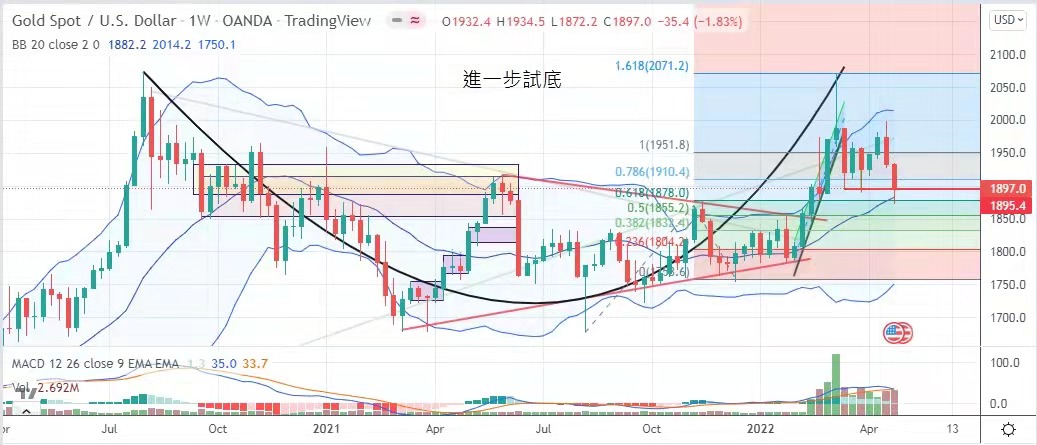Helpless
May 2nd
Today's volatility range:
Western countries' economic war against Russia will further push up energy prices and increase the attractiveness of gold.
The U.S. economy is reversing its best performance since 1984. Whether the Fed's goal of tightening policies to curb inflation will be slightly stabilized in the annual meeting will reduce the downward pressure on the gold price.
Only next week, the U.S. interest rate will increase steadily by 0.5%, and the gold market will remain bearish. Today, the suggested range of last Friday is still maintained, that is,$1885 to $1902.
The epidemic situation in the mainland has become more severe.
Shanghai has been locked down, the first port city in the country has been closed down, and cases of infection have also been reported in Hangzhou and Beijing's Chaoyang District.
The outside world has questioned the effectiveness of the mainland's insistence on handling the epidemic in a way of dynamic clearing. In reality, the performance of China's economic data is also poor. The manufacturing data has fallen for two consecutive months, and the RMB exchange rate has been falling sharply for consecutive days a week ago.
In addition, President Xi Jinping presided over a meeting of the Central Finance and Economics Committee yesterday, proposing to comprehensively strengthen infrastructure construction, to accelerate the construction of new infrastructure, including strengthening the construction of network-based infrastructure such as transportation, energy, and water conservancy, and to ensure China's economic growth this year.
The growth rate exceeds that of the United States. China Securities Depository and Clearing Co., Ltd. announced that it will reduce the transfer fee for stock transactions to reduce the cost of investors.
Supported by many national policies, Hong Kong stocks rebounded last week, up 450 points or 2.18%. The Hang Seng Index closed at 21,089 points, but fell more than 4% throughout April.
Asian stock markets are worried that the global economy will also be dragged down by the outbreak of Covid-19 in many provinces and cities in China.
In addition, the war between Russia and Ukraine has always made investors have a negative view on the future of the European economy.
Last week, Poland and Bulgaria refused to pay Russian natural gas in rubles, and Russia immediately announced that it would stop supplying natural gas to Poland and Bulgaria, pushing up fuel prices immediately as an example.
Coupled with the expectation of the Federal Reserve's interest rate hike, the European stock market went down.
Although many European companies announced better-than-expected results last week, they could only narrow the decline.
In a week's summary, the three major European stock markets fell across the board, and the German DAX index fell by 0.31%; Paris CAC index fell by 0.72%; Britain's FTSE 100 index fell 0.3%.
The epidemic situation in the Mainland is getting worse, and investors are worried that it will affect the global economic development.
In addition, the market estimates that the United States Federal Reserve is inclined to adopt more drastic measures to raise interest rates.
According to the latest market survey, the probability that the Federal Reserve will raise interest rates by 0.5% in May is 97%, and the probability of raising interest rates by 0.75% in June also rises to 80%.
The market expects that the rising interest rate will put pressure on the stock market. Microsoft and Yuan Xuanzhou, the parent company of Microsoft, announced that the results in the first quarter of this year were better than market expectations, but still not enough to lead the The S&P 500 index fell 2.71%; Nasdaq index fell 3.76%.
The monetary policy of the European Central Bank will lag behind that of the United States, providing good news for the short-term trend of the US dollar.
Coupled with the worsening epidemic situation in China, the market is worried that China's economic prospects will be dragged down.
The US dollar is relatively strong, and the US dollar index has reached a high of more than two years, rising above the 103 level. In addition, the market expects the US Federal Reserve to raise interest rates by more than 1% in May and June.
The gold market went down last week, and the lowest gold price was $1,872.2.
Although last Thursday, the US announced that its GDP had unexpectedly shrunk, In addition, the core personal consumption expenditure price index continued to rise, highlighting the high inflation situation in the United States.
It once brought the gold price back to $1,900, but with the rising dollar, the gold market was relatively eclipsed, and finally closed at $1,897. After a week, the gold price dropped by $34.6.
For detailed analysis and operation suggestions, please CLICK the following link to join the group and ask the administrator.
https://t.me/mingtakchat
Previous Article Next Article


 Whatsapp
Whatsapp Telegram
Telegram

